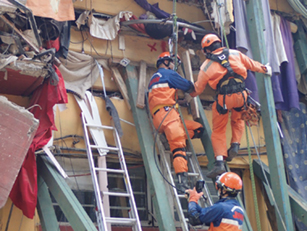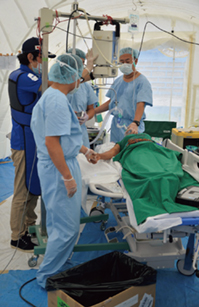ODA Topics 3
30 Years of the Japan Disaster Relief (JDR) Law
The year 2017 marked the 30th year since the Law Concerning Dispatch of the Japan Disaster Relief Team (JDR Law) came into effect in August 1987. The JDR Law was enacted to specify the measures required for dispatching the JDR Team in the event of major disasters occurring overseas, particularly in developing regions, in response to requests from the governments of affected countries or international organizations, as part of efforts to promote Japan's international cooperation. Later, the Peace Keeping Operation (PKO) Law came into effect in 1992, clarifying the status of emergency aid such that conflict-related humanitarian support came under the PKO Law while major natural disasters or man-made disasters came under the JDR Law. Since a team of experts was first dispatched in response to the flooding in Venezuela in 1987, a total of 145 teams have been dispatched to 45 countries and regions (as of December 2017).
Humanitarian assistance and emergency relief carried out by the Government of Japan can generally be categorized into (i) the dispatch of Japan Disaster Relief Teams, (ii) provision of emergency relief goods, and (iii) Emergency Grant Aid, and one or more of these is provided according to the nature of the request from the affected country and the scale of the disaster. The five types of Japan Disaster Relief Teams are the Search and Rescue Team, Medical Team, Infectious Diseases Response Team, Expert Team, and Self-Defense Force Unit. The type of team and the detail of its activities is considered by the Ministry of Foreign Affairs, in cooperation with other related ministries and agencies, based on the request from the government of the affected country or the international organization (what kind of support is needed) and the scope and type of disaster, before making the decision to dispatch.

The Japan Disaster Relief Search and Rescue Team engaged in search and rescue operations after an earthquake in Mexico (Photo: JICA)
Recently, the JDR Search and Rescue Team deployed in response to the magnitude 7.1 earthquake in central Mexico which struck on September 20, 2017 Japan time. The primary mission of the Team was to search for and extract victims from collapsed buildings, provide first aid when necessary, and evacuate them to a safe location. The team was comprised of personnel from the Ministry of Foreign Affairs, the National Police Agency, the Fire and Disaster Management Agency, the Japan Coast Guard and JICA for a total of 70 members who departed Tokyo for Mexico on September 21, the day after the earthquake. In addition to the supplies and equipment required for operations, the JDR Team remains prepared at all times and bring their own water, food, and tents so that they may operate autonomously without causing a burden on the disaster affected areas. The equipment carried by the teams have constantly improved over the past 30 years along with technological advancements. On this rescue operation, the Search and Rescue Team searched for survivors with the help of rescue dogs on a 24-hour rotation, even sometimes covering two locations simultaneously. The temperature in Mexico City would drop to almost 10 degrees Celsius at night due to the high elevation, sometimes accompanied by cold rain. Luckily, the Team was able to use a facility of the Asociación México Japonesa (Mexico Japan Association) as their base of operations, originally established by descendants of Japanese immigrants. It was a great help for the team members to be able to rest in a safe building as they carried out their operations under harsh conditions. The words of gratitude and support received by the Search and Rescue Team from local Mexican residents also provided them with a great boost of energy. The JDR Team has frequently received warm support and engaged with the local people in affected areas over its 30 year history, highlighting their important role as visibility of Japanese assistance.

The J DR Medical Team performs surgery after the 2015 earthquake in Nepal. (Photo: JICA)
There have been notable improvements in recent years in the disaster response capabilities including the disaster risk reduction of developing countries. It is expected that JDR carries out high quality support based on experiences to past disasters in Japan and technical capacities. Accordingly, the teams are proactively engaged in developing and improving their capabilities through training and drills, and preparing international guidelines to achieve better support. One example of the latter is the Minimum Data Set (MDS), a list of common medical data items that should be reported by foreign medical teams when carrying out support activities in disaster affected countries. The MDS was developed based on the experience of the Japan Disaster Relief Medical Team providing medical support in disaster affected regions after the 2013 typhoon in the Philippines. It was adopted as an international standard by the World Health Organization (WHO) in February 2017 and is currently being spread throughout the global disaster medical field.
The JDR Team will continue to leverage its 30-year history to achieve even better support with the cooperation of the international society.
